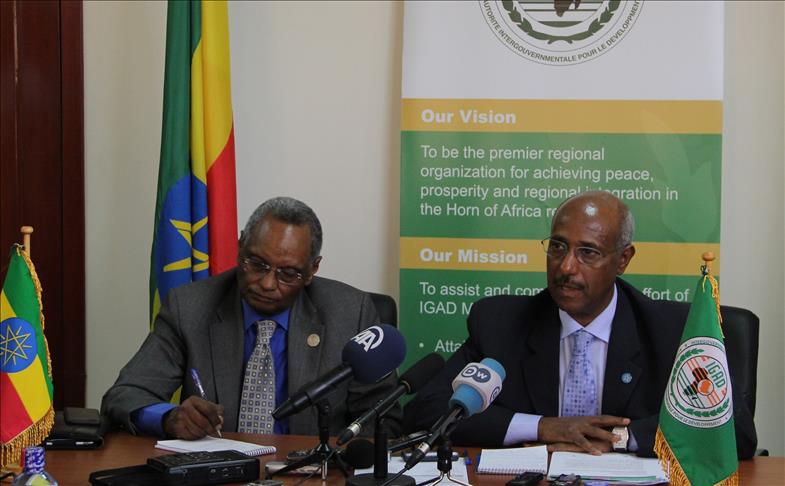
ADDIS ABABA, Ethiopia
Three days of consultations between mediators from the Intergovernmental Authority on Investment (IGAD) and South Sudanese stakeholders have produced several recommendations for ending South Sudan’s ongoing political crisis.
The consultations were attended by Nhial Deng Nhial, chief negotiator for the South Sudanese government; Gen. Taban Deng, chief negotiator for the SPLM/A-in-opposition; and a delegation of ten individuals earlier detained by Juba, headed by former SPLM Director-General Pagan Amum.
A document issued following the consultations contained several recommendations for resolving the outstanding differences between South Sudan’s warring rivals – especially those pertaining to power sharing, national security and wealth sharing.
The recommendations were issued as part of a more comprehensive, yet-to-be-released document devoted to the anticipated launch of a new peace initiative for South Sudan dubbed “IGAD-Plus”.
“We have fully accepted… the new mechanism [for talks] and are ready to continue negotiating,” Gen. Deng, chief negotiator for rebel leader Riek Machar, told reporters on Thursday.
The rebel negotiator, however, went on to express serious reservations about some of the recommendations laid out in the document.
“The summary we were given yesterday – we do not think it is the way forward,” he said.
“For example,” Deng said, “the document… addresses only the crisis in the great Upper Nile, while ignoring the war in Bahr El Gazel, ignoring the war in Equatoria, ignoring the root causes of the conflict.”
He added: “It is actually a summary formaintaining the status quo of [President] Salva Kiir being president, with the same system of governance, the same system of domination by elites.”
He was referring in particular to the part of the document devoted to power sharing, which states that Kiir’s government should hold 53 percent of the ministerial portfolios in a planned transitional government.
“This is maintaining the status quo,” the general said.
The just-concluded round of consultations came ahead of the anticipated launch of “IGAD-plus”, a revitalized peace initiative for South Sudan.
The initiative would see five new African countries added to the current mediation team, in addition to the UN, the AU, the EU, the International Partners Group (IPF), the so-called “Troika” (comprising the U.S., U.K. and Norway) and China.
-Unified army-
Nhial, for his part, the government’s chief negotiator, told Anadolu Agency that the transitional period – scheduled to begin on July 9 – should see the introduction of a single, unified South Sudanese army.
“The idea of the rebels having their own army during the transitional period… should be dismissed out of hand,” he said. “But the mediation [process] does not seem able to do that,” he said, warning that the process, therefore, “will not gain traction”.
The rebel negotiator, however, slammed these assertions, saying the unification of the army could not be carried out within only three months as was recommended in the summary document.
“We did not talk of two armies. We have been talking about the length of the period[in which] we can unite or amalgamate these two armies,” Gen. Deng said.
IGAD, an East African regional bloc based in Djibouti, hopes to launch its new peace initiative after IGAD heads of state and government meet on the sidelines of an African Union Summit currently underway in Johannesburg.
IGAD-mediated peace talks for South Sudan, hosted by Addis Ababa, broke down in March despite a series of face-to-face meetings between Kiir and Machar in which the two leaders failed to resolve their differences.
South Sudan has been shaken by violence since late 2013, when Kiir accused Machar, his sacked vice president, of attempting to overthrow his government.
IGAD-led peace talks, which began early last year in the Ethiopian capital, have so far failed to produce any tangible breakthroughs.
The last round of talks on March 6 hit a snag after the two rivals failed to agree on almost all outstanding political and military-related issues.
Since the conflict began one and a half years ago, tens of thousands of South Sudanesehave been killed and nearly two million have reportedly been displaced.
Last week, the UN refugee agency (UNHCR) said that over 100,000 South Sudanese had been displaced within the last two months alone due to ongoing fighting in Unity and Upper Nile states.
The UNHCR went on to warn that continued fighting had also prevented humanitarian aid deliveries from reaching some 650,000 people in South Sudan after aid organizations were forced to withdraw from combat zones.
According to a recent report issued by the World Food Program, as many as 40 percent of South Sudan’s population is currently at risk of going hungry.
Anadolu Agency website contains only a portion of the news stories offered to subscribers in the AA News Broadcasting System (HAS), and in summarized form. Please contact us for subscription options.

